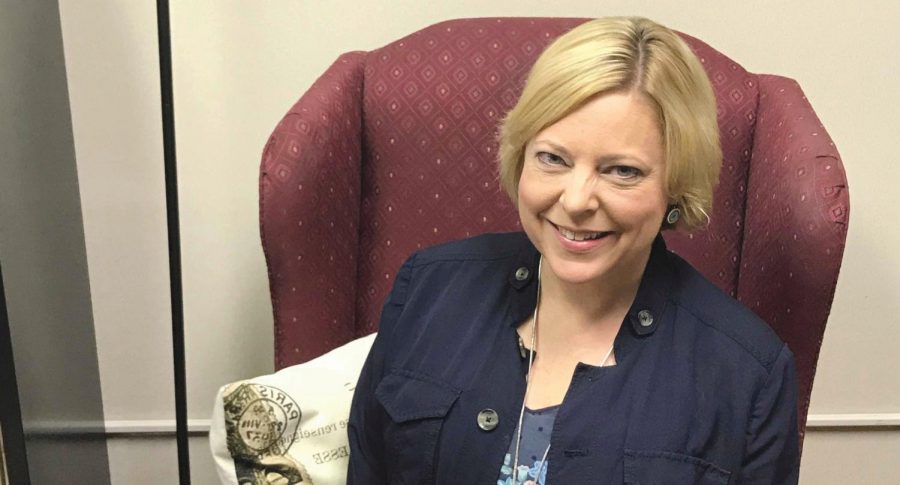Professor Spotlight: Elizabeth A. Zahnd
Photo by: Caleb Reeves
Elizabeth Zahnd appreciates the opportunity to balance reading and interacting with students, family and colleagues during her teaching career at FMU.
For Elizabeth Zahnd, professor of modern languages and coordinator of the French program, her interests in language, traveling and connecting with people were evident early on in her life from her relationship with her childhood pen pal.
Zahnd said she always wanted to travel abroad to better understand other languages and cultures, so she seized an opportunity to communicate with a pen pal overseas in middle school, who encouraged her to improve her French.
“In middle school, our English teacher had us write a letter to a student at a different high school,” Zahnd said. “Most of my classmates wrote to other high schools in the U.S., but I sent mine to Switzerland, to the little village where my dad came from. I got a response back, and she wrote in English, but she said her French was better, so I took French so I could write my pen pal. We became long-term friends.”
After three years of high school French, Zahnd went on to earn her bachelor’s degree in French and foreign service from Baylor University. For her master’s, she studied in France for a year and attended two higher education institutions: l’Université Paris Nanterre (The University of Paris Nanterre) and l’Institut d’Études Politiques de Paris (The Paris Institute of Political Science). For her Ph.D., she pursued an interdisciplinary French studies degree at the University of Illinois at Urbana-Champaign.
When it came time to choose what career path she wanted to pursue, Zahnd decided to keep studying politics and international studies in addition to her main focus in languages.
“I debated between politics, like international relations, and French,” Zahnd said. “So, I double majored at Baylor University. I knew I wanted to go to graduate school and it was either going to be foreign service or languages. I ultimately chose languages because I didn’t think I wanted work for the government, because you have to promote the interests of the United States even if it goes against what you believe or if it works against the local population. I didn’t think I could do that; I’m very true to my values. At the Ph.D. level, I still kept the political science.”
Zahnd said her interest in politics has always been important in her study of other languages and her understanding of other cultures. Particularly, her educational background has been instrumental in developing her ongoing research of terrorism in Europe. In her research, she looks at the reactions of authors and philosophers who write about incidents of terrorism in their own countries and others. She observed a sympathy toward, and sometimes a critique of, events and the associated country that seem to defy lingual and cultural barriers.
Zahnd said aside from the interesting perspectives that she finds in her research, she strives to provide opportunities for her students to gain new perspectives through studying abroad. However, there was no French study abroad program at FMU before Zahnd arrived.
“We send two students every year, and it’s the greatest thing I get to do,” Zahnd said. “I love sending students overseas and hearing their stories when they return and how much they’ve grown and matured as individuals. It connects them with people and expands their horizons, to look at the world with a different view through the different cultural perspectives. It’s a privilege for me to see how my assisting in that process helped changed their life and made them a more well-rounded individual. I get to share my passion for foreign languages and cultures with students, and when I see that same passion in my students, it’s so rewarding for me personally. I think it’s something unique to Francis Marion that there’s such support for study abroad and that it fits with our mission.”
During her job search, Zahnd said she came to FMU because, as an institution, it embodied several important aspects to her: a good rapport with faculty and students, an ideal size and a place where no one is just a number.
